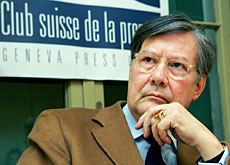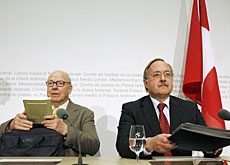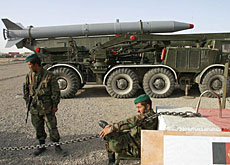Arms control talks limp along in Geneva

Talks in Geneva aimed at moving towards a new series of arms control treaties remain deadlocked at a "critical stage", according to a senior Swiss diplomat.
Ambassador Jürg Streuli said on Thursday that time was running out to make progress this year on the package, which includes issues such as the demilitarisation of outer space.
Streuli, the current president of the Geneva-based Conference on Disarmament (CD), said opposition from three countries – China, Pakistan and Iran – was blocking efforts to reach consensus. China, however, is understood to be shifting position.
The 65-strong body, which includes all the known nuclear powers, is trying to approve a mandate for the negotiation of a new treaty banning the production of fissile material for nuclear weapons.
At the same time it wants to start in-depth discussions on the issues of nuclear disarmament, the prevention of an arms race in outer space and so-called “negative security assurances”. These are when nuclear states guarantee not to attack non-nuclear states with nuclear weapons.
“This year we have made considerable progress. In the past ten years we have never been so close to a compromise. It’s just three countries that are blocking things for the time being,” Streuli told swissinfo.
The CD’s third and final session of 2007 concludes on September 14. Streuli says that unless members can reach consensus by the end of August, discussions will have to be put on hold until next year.
Fissile materials
The CD has been trying to negotiate a ban on the production of fissile materials, such as enriched uranium, since 1995. But the end of the Cold War and a more complex global landscape have severely hampered progress.
“It was probably easier to negotiate in a bipolar world where you had the two superpowers. Today the whole security situation is asymmetrical and the interests are not convergent,” said Streuli.
Nuclear powers that have sufficient stocks of fissile material are in favour of a production ban; those that are still in the process of building a nuclear programme are against.
The same argument applies to the demilitarisation of outer space: those that are ahead in terms of space technology are not interested in a treaty; those that are lagging behind or lack the financial means are in favour.
“To bring all these interests under one hat is extremely difficult and complex,” said Streuli. “It’s not an impossible task and we are trying everything. But these questions we are talking about are of prime national security interest for certain countries. These are decided at the highest level, so this takes some time.”
Spanner in the works
The lengthy stalemate on fissile materials has raised question marks over the conference’s capacity to manage multilateral arms control negotiations. Under the body’s rules and procedures, it takes only one country to put a spanner in the works and some believe it is time for change.
The last accord negotiated by the CD was the Comprehensive Nuclear Test Ban Treaty in 1996 but it has since been unable to reach consensus on any negotiation mandate.
Rebecca Johnson, executive director of the London-based Acronym Institute for Disarmament Diplomacy, says the body has become a “bottleneck” for multilateral arms control.
“The CD serves as a convenient blocking mechanism for those states that don’t want to move ahead with all kinds of arms control treaties,” she said.
Johnson added that it was one thing for states to fight their corner when it came to treaty negotiations but the process was being “paralysed” long before it could reach that stage.
Unlike Streuli, she qualified this year as a “complete disaster” and warned that it was time for a major rethink.
“The CD either has to change its rules and procedures or it will become completely irrelevant. I think states are getting to the end of their tether,” she said.
swissinfo, Adam Beaumont in Geneva
The main purpose of the CD is to negotiate arms control treaties. It is currently focusing on issues including: the cessation of the nuclear arms race and nuclear disarmament; prevention of an arms race in outer space; effective international arrangements to assure non-nuclear-weapon states against the use or threat of use of nuclear weapons; and new types of weapons of mass destruction.
The CD and its predecessors have negotiated such major multilateral arms limitation and disarmament agreements as the Treaty on the Non-Proliferation of Nuclear Weapons, conventions banning biological and chemical weapons, and the Comprehensive Nuclear Test Ban Treaty.
It is regarded as an autonomous body, although it has a close relationship with the United Nations.

In compliance with the JTI standards
More: SWI swissinfo.ch certified by the Journalism Trust Initiative


You can find an overview of ongoing debates with our journalists here. Please join us!
If you want to start a conversation about a topic raised in this article or want to report factual errors, email us at english@swissinfo.ch.